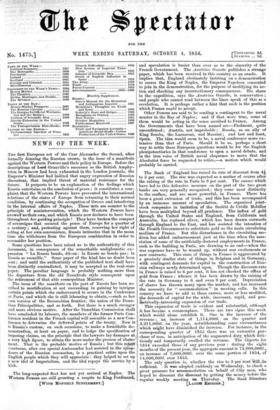NEWS OF THE WEEK.
-THE first European act of the Czar Alexander the Second, after formally donning the Russian crown, is the issue of a manifesto against the Western Pawers and their policy in Europe. Before the descriptions of Lent Granville's successes as the British Amphy- trion in Moscow had been exhausted in the London journals, the Emperor's Minister had indited that angry expression of Russian discontent, that implied threat of material resistance for the future. It purports to be an explanation of the feelings which Russia entertains on the conclusion of peace ; it constitutes a com- plaint that the Western Powers have prevented the international relations of the states of Europe from returning to their normal condition, by continuing the occupation of Greece and interfering in the internal affairs of Naples. These acts are counter to the principle of nonintervention, which the Western Powers have avowed.- as their own, and which Russia now declares to have been throughout her guiding principle ! They have broken the compact of sovereigns that secured the peace of Europe for a quarter of a century ; and, protesting against them, reserving her right of acting at her own convenience, Russia intimates that in the mean time she withdraws from the European combination in order to reconsider her position.
Some questions have been raised as to the authenticity of this document, in consequence of the remarkable undiplomatic ex- pression "La Russie boude, dit-on : la Russie ne boude pas ; la Russie se recueille." Some paper of the kind has no doubt been sent ; said until the authenticity of the published text shall have been- distinctly contradicted, it may be accepted as the real-state paper. The peculiar language is probably nothing more than the departure from the old Nesselrode style consequent upon the retirement of that able cosmopolitan Minister.
• The issue of the manifesto on the part of Russia has been as- cribed to mortification at not succeeding in gaining by intrigue certain points which she endeavoured to secure in the Conference at Paris, and which she is still labouring to obtain,—such as her own version of the Bessarabian frontier' the union of the Danu- bian Principalities, and so forth. But there is a much stronger and more obvious motive. After the Danubian Commission shall have concluded its Isbell's, the members of the former Paris Con- ference resident in the French capital will assemble as a new Con- ference to determine the deferred points of the treaty. Now i is Russia's custom, on such occasions, to make a formidable de- monstration, at least on paper, and to lodge the specification of imposing claims, on the principle that the lawyers lay damages at. a very high figure, to obtain the more under the process of abate-' ment. That is the probable motive of Russia ; but this retest courteous, after our special Ambassador had assisted in the splen,- dours of the Russian coronation, is a practical satire upon the English people which they will appreciate : they helped to set up a new idol of Imperialism, and the idol repays the service by a kick.


































